University certificate
The world's largest faculty of journalism and communication”
Introduction to the Program
Become an excellent Journalist and learn how to tell what is happening in the world"

Journalism studies are one of the most demanded in all universities, since this profession has a great influence on the population and has gained great prominence since its beginnings. Journalism encompasses different branches: social, cultural, economic, sports, international, events, conflicts, etc. This makes it necessary for professionals in this field to specialize in order to tell stories in the most appropriate way in each case.
Additionally, the transmission of information can be carried out through different media. Specifically, this program aims to specialize students in Theory of Journalism To do so, it is necessary to acquire a series of skills that allow you to put into practice all that has been learned.
The syllabus addresses the different types of newspapers, the main journalistic tools and skills, how a newspaper is distributed or the characteristics of journalism in politics and society, among other topics.
This program is the most complete and directed for the professional in the field of Journalism to reach a high level of performance, based on the fundamentals and the latest trends in the media. Take advantage of the opportunity and become a professional with solid foundations through this program and the latest educational technology 100% online.
This program will allow you to improve your skills and become a successful Journalist”
This Postgraduate certificate in Theory of Journalism contains the most complete and up-to-date program on the market. The most important features include:
- Development of practical cases presented by experts in Journalism Theory
- The graphic, schematic, and practical contents with which they are created provide scientific and practical information on the disciplines that are essential for professional practice
- Practical exercises where self-assessment can be used to improve learning
- Special emphasis on innovative methodologies for teaching Journalism Theory
- Algorithm-based interactive learning system for decision-making in the situations that are presented to the student
- Theoretical lessons, questions to the expert, debate forums on controversial topics, and individual reflection assignments
- Content that is accessible from any fixed or portable device with an Internet connection
This Postgraduate certificate is the perfect way to complement your knowledge in journalism”
Its teaching staff includes professionals from the world of journalism, who bring to this program the experience of their work, as well as renowned specialists from prestigious reference societies and universities.
Its multimedia content, developed with the latest educational technology, will enable the professional to contextual and situated learning, i.e. a simulated environment that will provide immersive learning immersive learning programmed to prepare in real situations.
This program is designed around Problem-Based Learning, whereby the professional must try to solve the different professional practice situations that arise throughout the program. To do so, the professional will be assisted by an innovative interactive video system created by renowned and experienced experts in the field of Theory of Journalism.
Don't miss the opportunity to increase your skills in Theory of Journalism"

Join our community of students and acquire the most advanced knowledge in your career"
Why study at TECH?
TECH is the world’s largest online university. With an impressive catalog of more than 14,000 university programs available in 11 languages, it is positioned as a leader in employability, with a 99% job placement rate. In addition, it relies on an enormous faculty of more than 6,000 professors of the highest international renown.

Study at the world's largest online university and guarantee your professional success. The future starts at TECH”
The world’s best online university according to FORBES
The prestigious Forbes magazine, specialized in business and finance, has highlighted TECH as “the world's best online university” This is what they have recently stated in an article in their digital edition in which they echo the success story of this institution, “thanks to the academic offer it provides, the selection of its teaching staff, and an innovative learning method aimed at educating the professionals of the future”
A revolutionary study method, a cutting-edge faculty and a practical focus: the key to TECH's success.
The most complete study plans on the university scene
TECH offers the most complete study plans on the university scene, with syllabuses that cover fundamental concepts and, at the same time, the main scientific advances in their specific scientific areas. In addition, these programs are continuously being updated to guarantee students the academic vanguard and the most in-demand professional skills. In this way, the university's qualifications provide its graduates with a significant advantage to propel their careers to success.
TECH offers the most comprehensive and intensive study plans on the current university scene.
A world-class teaching staff
TECH's teaching staff is made up of more than 6,000 professors with the highest international recognition. Professors, researchers and top executives of multinational companies, including Isaiah Covington, performance coach of the Boston Celtics; Magda Romanska, principal investigator at Harvard MetaLAB; Ignacio Wistumba, chairman of the department of translational molecular pathology at MD Anderson Cancer Center; and D.W. Pine, creative director of TIME magazine, among others.
Internationally renowned experts, specialized in different branches of Health, Technology, Communication and Business, form part of the TECH faculty.
A unique learning method
TECH is the first university to use Relearning in all its programs. It is the best online learning methodology, accredited with international teaching quality certifications, provided by prestigious educational agencies. In addition, this disruptive educational model is complemented with the “Case Method”, thereby setting up a unique online teaching strategy. Innovative teaching resources are also implemented, including detailed videos, infographics and interactive summaries.
TECH combines Relearning and the Case Method in all its university programs to guarantee excellent theoretical and practical learning, studying whenever and wherever you want.
The world's largest online university
TECH is the world’s largest online university. We are the largest educational institution, with the best and widest online educational catalog, one hundred percent online and covering the vast majority of areas of knowledge. We offer a large selection of our own degrees and accredited online undergraduate and postgraduate degrees. In total, more than 14,000 university degrees, in eleven different languages, make us the largest educational largest in the world.
TECH has the world's most extensive catalog of academic and official programs, available in more than 11 languages.
Google Premier Partner
The American technology giant has awarded TECH the Google Google Premier Partner badge. This award, which is only available to 3% of the world's companies, highlights the efficient, flexible and tailored experience that this university provides to students. The recognition as a Google Premier Partner not only accredits the maximum rigor, performance and investment in TECH's digital infrastructures, but also places this university as one of the world's leading technology companies.
Google has positioned TECH in the top 3% of the world's most important technology companies by awarding it its Google Premier Partner badge.
The official online university of the NBA
TECH is the official online university of the NBA. Thanks to our agreement with the biggest league in basketball, we offer our students exclusive university programs, as well as a wide variety of educational resources focused on the business of the league and other areas of the sports industry. Each program is made up of a uniquely designed syllabus and features exceptional guest hosts: professionals with a distinguished sports background who will offer their expertise on the most relevant topics.
TECH has been selected by the NBA, the world's top basketball league, as its official online university.
The top-rated university by its students
Students have positioned TECH as the world's top-rated university on the main review websites, with a highest rating of 4.9 out of 5, obtained from more than 1,000 reviews. These results consolidate TECH as the benchmark university institution at an international level, reflecting the excellence and positive impact of its educational model.” reflecting the excellence and positive impact of its educational model.”
TECH is the world’s top-rated university by its students.
Leaders in employability
TECH has managed to become the leading university in employability. 99% of its students obtain jobs in the academic field they have studied, within one year of completing any of the university's programs. A similar number achieve immediate career enhancement. All this thanks to a study methodology that bases its effectiveness on the acquisition of practical skills, which are absolutely necessary for professional development.
99% of TECH graduates find a job within a year of completing their studies.
Postgraduate Certificate in Theory of Journalism
If you are looking for a quality education in the field of journalism, TECH Global University is your best option. Our renowned Faculty of Journalism and Communication offers a complete Postgraduate Certificate in Theory of Journalism, available completely online so you can study from anywhere and on your own schedule. With a track record of academic excellence, TECH has a team of highly qualified professors and a solid curricular structure that will allow you to acquire the technical and theoretical knowledge necessary to excel in the world of journalism. One of the most outstanding advantages of our virtual course is the flexibility it offers. You can adapt your study schedule to your needs, allowing you to reconcile your personal and professional responsibilities with your academic education. In addition, online study allows you to access study materials at any time and place, which gives you greater convenience and autonomy in your learning process.
Study an online course in the theory of journalism
According to statistical data, 95% of the graduates of our Postgraduate Certificate in Theory of Journalism have achieved job placement in recognized media within 6 months after completing the program. This demonstrates the effectiveness of our pedagogical approach and the relevance of the course contents in the work field. Our program covers a wide range of topics, such as journalism theories, journalistic ethics and deontology, media history, information analysis, writing techniques and journalistic editing, among others. In addition, our multidisciplinary approach will allow you to develop complementary skills, such as handling digital tools and understanding the current challenges of journalism in the digital era. If you are looking for quality education in the field of journalism, the TECH course is an excellent option. Enroll today and start taking the first steps in your successful journalism career!







